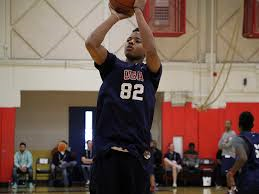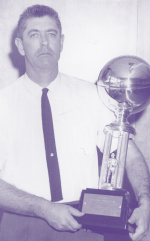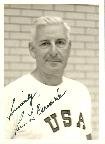We have already lost so many amazing people in 2016 to violence, disease, and old age, and July is being no kinder with the news that Hall of Famer Nate Thurmond passed away yesterday at the age of 74 after battling leukemia. At Bowling Green he became the only player in MAC history to ever lead the conference in rebounding for 3 consecutive seasons, then continued to prove his rebounding prowess by grabbing 42 in a game against the Pistons in 1965. Rather than just a big guy who hit the boards, he demonstrated his endurance by playing all 63 minutes of a 3-OT game in 1969, then showed off a little of everything in 1974 by becoming the 1st player in NBA history to officially record a quadruple-double. HoopsHD’s Jon Teitel had the privilege of interviewing Mr. Thurmond a few years ago, and is proud to share this never-before-published interview below. We send our condolences to his family/friends as we salute 1 of the best players in the history of the sport.
1 of your Akron Central High School teammates was fellow future Hall of Famer Gus Johnson: how dominant was your team back in the day? Gus was a tremendous player even back then: he was a lot better than I was. 1 year we went into the Ohio state playoffs 1with an undefeated record and played a school called Liberty. They pressed us all game long and we did not have a good scheme to get the ball upcourt, which was our downfall in the only loss of our season.
What are your memories of the 1962 NCAA tourney as a player at Bowling Green (you had 21 PTS/14 REB in a 1-PT loss to Butler)? I do not have a lot of memories but I recall that Butler was an even smaller school than us so were kind of shocked by them. When it is 1-and-done in the tourney if you have an off night and the other team is on then they can pull off the upset, which is kind of what happened.
What are your memories of the 1963 NCAA tourney (you had 16 PTS/20 REB in a 5-PT win over Notre Dame)? That was an eye-opener for me because Notre Dame was a much bigger school. When you play against a team from a good conference they play much rougher so there were not as many fouls called that night. It was a credit to our coach.
You were a 3-time 1st-team all-conference pick and an All-American in 1963: what did it mean to you to win such outstanding honors? It just meant that my career was progressing as an individual, but you cannot get all of those accolades unless your team is successful so it was validation on both of those points. It also showed that I had been practicing hard and that it was paying off. I played with some great players, including Butch Komives/Elijah Chapman.
You remain the only player in MAC history to lead the conference in REB for 3 consecutive seasons: did you realize at the time how prolific a player you were, and do you think that anyone will ever break your record? I had worked hard on my game and began to have some success. I hope the record is not broken…but as I get older it does not matter that much to me!
In February 1965 you set a regular-season record that still stands with 18 REB in 1 quarter vs. Baltimore, and in November 1965 you had a career-high 42 REB in a game vs. Detroit (becoming the only players besides Bill Russell/Wilt Chamberlain to ever have more than 40 REB in a game): what was your secret for being a great rebounder? You have to have the “desire to be a center”. 1 of your jobs is to rebound the ball, otherwise you do not get to go back on offense. You also need to understand little things like the way the ball bounces off the rim, how to get position, etc., all of which I learned from my high school coach.
In Game 6 of the 1967 Finals you scored 12 PTS in a 3-PT loss at home to Philly: where does that 76ers team (who won a then-record 68 regular season games) rank among the greatest teams that you ever saw? There is no question that they were a really good team but we still could have beaten them in that series. Rick Barry never let me forget the time that we ran a pick-and-roll and instead of passing to him and I ended up taking a shot that was blocked by Wilt. I will say to my dying day that it was goaltending but the refs did not call it that way. I could kind of negate what Wilt was doing, which left us in a 4-on-4. By “negate” I am not saying that I could stop him, but I could at least bring down his output.
In February 1969 you set a record that stood for over a decade by playing all 63 minutes of a 3-OT 5-PT win over the Lakers: how on earth were you able to play the whole game without taking a rest? I was the kind of guy who once I started the season and had 10-15 games under my belt I was in shape and could play a whole game. I perfected the art of learning when I could take a breather. Occasionally I would not go as hard on the offensive boards as a I could have but I would do my thing on the defensive boards. When I was playing with Wilt I remember that he played almost every minute of the entire season and that is the mentality I looked to have. After Wilt left our team had no money left for a good backup center so I did not look to go to the bench.
After being traded to Chicago in September 1974 you had 22 PTS/14 REB/13 AST/career-high 12 BLK in your Bulls’ debut (a 5-PT OT win over Atlanta), becoming the 1st player in NBA history to officially record a quadruple-double: how big a deal was it at the time, and were you worried that you had raised the bar too high for your new fans? At the time nobody knew: if my recollection was right it was not even discovered until 2-3 days later! I was trying to prove to the Warriors that they had made a mistake by trading me after I spent 11 years with them. I did raise the bar too high because I was not used to that offense: standing at the foul line and feeding our forwards was not the best use of my talents.
You were named to the All-Defensive team 5 times in a 6-year span from 1969-1974: what was your secret for being a great defender? In high school our coach evaluated us by how we played man-to-man defense: if I scored 20 PTS but my opposing center outscored me then I was a liability to our team. I was not always the highest scorer out there but very seldom did I let my opponent outscore me. My senior year I remember playing in a pro-am game against Bill Russell, who said that it is demoralizing to your opponent if you can score on him and he cannot score on you.








Puppet Ramblings: The “Bathroom Law” Boycott Will Accomplish Nothing!
For starters, I don’t like it when sports, particularly college sports, are used as a political tool by political leaders who have nothing to do with sports. I obviously love college basketball, but I also love international soccer. If anything, it is refreshing to be able to not harp on your different political ideologies, but rather set them all aside and collectively enjoy something that belongs to all of us. This is definitely true with international soccer, but I feel that it is true for all levels of sport, including college basketball. Given the current climate of this country, we need more shared experiences, not less of them, and for better or worse, sport appears to be one of the vehicles where we can have a shared experience with people who have very different views and opinions, but during that experience feel like we are the same.
I need to say that we, as a staff, do not like to talk politics on Hoops HD. This is not a political site. Although we all have political opinions, we do not express them here or use this site as a vehicle for our own political ideologies. I am not writing this as an attempt to change or criticize anyone’s political viewpoints or opinions, but rather to criticize the methods New York Governor Andrew Cuomo has chosen to use in response to the HB2 laws (ie the Bathroom Laws) in North Carolina. More specifically, the impact those methods have on the college basketball programs in the state of New York (and Albany in particular), as well as college basketball as a whole.
This past March, Governor Cuomo issued an executive order banning all state sponsored non-essential travel to the state of North Carolina. He did this, presumably, because he felt that the HB2 laws were discriminatory toward the LBGTQ community and wanted to disassociate himself from that discrimination. Is this nothing more than disingenuous political posturing on his part?? I don’t know. Does he actually think this will be effective?? I don’t know. Did he ever consider how it was possibly unfair not just to the intercollegiate teams in the state of New York, but to the people in the state of North Carolina who strongly oppose the HB2 laws?? I don’t know. I don’t know what is in his heart or in his head, so I won’t even try and guess. I will say this, though….
This method is both unfair and ineffective. Albany was scheduled to open the upcoming college basketball season at Duke, and has now been made to back out of the game. The only people that are really directly impacted by this are the players and coaches on both teams, and none of them had anything to do with the HB2 laws. In addition to that, Duke is a private institution, so it is not tied to the state of North Carolina. Not only that, but as an institution Duke was strongly opposed to the HB2 laws. I fail to see how not allowing Albany’s basketball team to play at Duke, which is a private institution that opposes the HB2 laws, will do anything change the laws. If anything, I think that going there and playing the game would create an assembly of people where the vast majority of them also oppose the law, so in a way not going to play the game results in less opposition to the Bathroom Laws, not more of it.
STATEMENT FROM DUKE “DEPLORING IN THE STRONGEST POSSIBLE TERMS” THE HB2 LAWS
Taking this a step further, in addition to Duke being strongly opposed to the laws as you can read in the link above, it is my understanding the majority of the people in the state of North Carolina are opposed to the laws as well. So, what is accomplished by disassociating yourself with them?? What is accomplished by deciding not to engage them in an inclusive and shared experience such as a sporting event?? I understand not liking bigotry. I also feel that if you want to combat bigotry, then alienating people who are not bigots (which the vast majority of college students and student-athletes are not), but happen to live in a state with laws that you feel are bigoted, is not the way to go about it. Rock & Roll, Soul, and R&B acts that toured the Deep South during the Civil Rights Movement accomplished a lot more than they would have by boycotting those states. Seriously, if Governor Cuomo genuinely feels opposed to the HB2 laws and isn’t just doing this for political posturing, then why isn’t he ENCOURAGING the New York college teams to go to a place like Duke who is also openly opposed to them?? This boycott is unfair. This boycott is ineffective. And, to take it a step further, this boycott is arguably COUNTER-productive. How so?? Well….
We’ve seen sports boycotts before. The 1980 and 1984 Olympics comes to mind. I cannot think of a single example where a sports boycott had any sort of a meaningful impact. Not one. Now, having said that, I can think of multiple examples of where NOT boycotting had HUGE impacts. Jessie Owens did not boycott. Tommy Smith and John Carlos did not boycott. If you’ve ever seen the movie Invictus, Nelson Mandela seemed to do the exact opposite of a boycott. Like I said at the beginning, sports allow us to have shared experiences with people that are different than us, and during that event make us the same. In many cases, it may be the only time we feel that we are the same. Is that bad?? I sure as hell don’t think so. If anything, we need more of that, not less of it. You’re not going to change peoples’ hearts and minds by ignoring them. You have to engage them. You have to find common ground. And, sport IS common ground. It’s one of the few common grounds that we have. It is a shame that there aren’t more, but at least sports gives us something
So, Governor Cuomo, please, keep your political differences out of college sports. Do not be unfair to the individual student-athletes who played no political roll in the HB2 laws, and who probably disagree with the laws themselves. Do not deny people with different political viewpoints and ideologies the chance to have a shared experience with one another. Sports brings us together, and it will do more to make us better than it will to make us worse. This boycott will accomplish nothing.